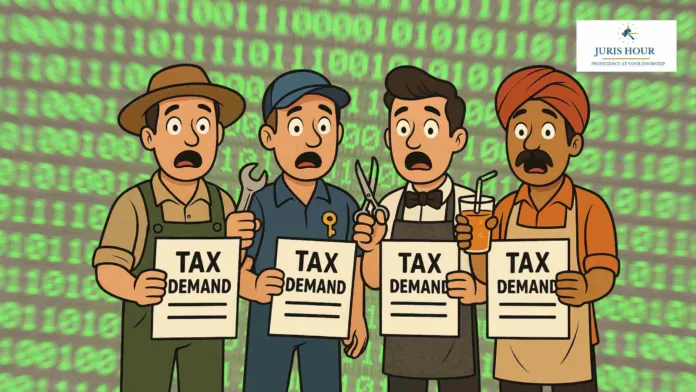In the era of Digital India, where technological advancements promise transparency and efficiency, a disturbing trend has emerged. Low-income workers, including farmers, laborers, and small-scale vendors, are receiving staggering tax notices worth crores of rupees. The root cause: their personal identification details, especially PAN and Aadhaar numbers, are being misused by fraudsters to establish fake companies and commit large-scale Goods and Services Tax (GST) fraud.
The Modus Operandi of Fraudsters
Fraudsters are exploiting the vulnerabilities of economically disadvantaged individuals by luring them with job offers or nominal cash benefits. In the process, they collect critical documents like PAN and Aadhaar cards. These details are then used to register shell companies under the victims’ names. These fictitious entities generate fake invoices and e-way bills, facilitating fraudulent Input Tax Credit (ITC) claims, leading to massive tax evasion.
How the PAN Card Data Fraud Works?
Authorities suspect that loan app companies—many of which have previously faced scrutiny for data privacy violations—could be the source of the PAN breach. Fraudsters often entice low-income individuals with fake job offers or microloans, collecting critical identification documents like PAN and Aadhaar in the process.
These stolen credentials are then used to:
- Register fake GST firms
- Generate bogus invoices
- Claim fraudulent Input Tax Credits (ITC)
This elaborate network of identity theft and financial laundering leaves the original cardholders—mostly daily wage earners, farmers, and informal workers—facing legal action and crippling tax notices running into crores.
Victims Across India
In a shocking revelation that underscores the dark underbelly of India’s digital economy, Rakesh Kumar, a humble barber from Ali Mohammad village in Sirsa, has been slapped with an income tax notice of ₹37.87 crore—an amount unfathomable for someone earning just ₹350 to ₹450 a day.
Operating his modest barber shop near Dera Sacha Sauda for over a decade, Rakesh lives in a two-room house built on common village land (shamlat) with his homemaker wife, tailor father, and elderly mother. Despite his limited means, he has found himself at the center of a multi-crore financial fraud—a fate increasingly shared by India’s economically vulnerable citizens.
This isn’t an isolated case. A rising number of victims are coming forward:
- Ashwani Kumar from Muzaffarnagar was duped into sharing his documents and later implicated in a ₹250 crore GST fraud.
- Saurabh Kumar, a farmer in Mathura, received a ₹30 crore income tax notice after fraudsters registered GST numbers under his PAN.
- Karan Kumar, earning ₹15,000 a month, got a ₹34 crore tax demand.
- Yogesh, a locksmith, was targeted for ₹11 crore in tax liabilities.
The Government’s Crackdown and Digital Pushback
In response, the Central Board of Indirect Taxes and Customs (CBIC) has initiated a nationwide crackdown on fake GST registrations. Since mid-2023, authorities have unearthed:
- Over 29,000 fake GST entities
- Fraudulent ITC claims worth ₹44,015 crore
- 121 arrests and multiple FIRs filed
To prevent further abuse, the government is now deploying:
- Biometric-based verification for GST registrations
- Geo-tagging of businesses
- Stricter KYC (Know Your Customer) protocols
Systemic Failures and the Need for Awareness
Despite these actions, the system remains deeply flawed. With digital infrastructure outpacing public awareness, low-income earners are being left behind in terms of cyber-literacy and data protection. Many are unaware of the consequences of sharing sensitive data or signing unfamiliar documents—often trusting fraudsters posing as recruiters or loan agents.
Experts are urging:
- Immediate public awareness campaigns in rural areas
- Free legal aid for victims
- Stronger data privacy laws for digital finance platforms
- A victim compensation mechanism
A Call to Protect the Marginalized in Digital India
As India accelerates its transition to a fully digitized economy, the vulnerable poor are paying the highest price. From barbers in Sirsa to farmers in Mathura, ordinary citizens are waking up to nightmare tax demands they have no knowledge or capability to contest.

